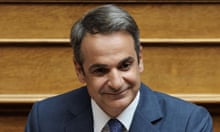Knocked off the front pages by Brexit and Donald Trump, Greece is back on the agenda. The country’s two most important creditors will meet in Berlin on Wednesday when the German chancellor, Angela Merkel, hosts the head of the International Monetary Fund, Christine Lagarde.
It could be a fateful meeting. Europe and the IMF have been at loggerheads for months over whether Greece will ever be able to repay its debts – a disagreement that has stopped the Washington-based fund from signing up to a €86bn-bailout programme crafted by EU leaders in July 2015. Merkel and other European leaders, who face elections, are anxious to bring the IMF on board, to persuade sceptical voters the bailout is credible.
Now signs of a compromise are emerging. This week eurozone leaders echoed the IMF in talking of the end of austerity, increasing the chances the fund will join the Greek bailout. Pierre Moscovici, the European commissioner for economic affairs, reported that 19 finance ministers of the single currency agreed that the Greek people needed to see “light at the end of the tunnel of austerity”.
But while the bailout chiefs are poised to agree on a route map, the journey for the Greek people seems no less long and arduous.
The crux of the dispute between the IMF and EU is a European demand for Greece to maintain a budget surplus of 3.5% for a decade from 2018, a feat few governments in the world have managed, much less one in a country with a 23% unemployment rate.
The IMF has been arguing for months that Greece cannot meet this target. “Greece does not need more austerity at this time,” two senior IMF officials wrote in a recent blog post, adding that the target for a primary budget surplus – the gap between government income and spending, excluding interest payments and national debt – would generate “a degree of austerity that could prevent the nascent recovery from taking hold”.
The EU maintains that the 3.5% target is achievable. But after a meeting of eurozone ministers on Monday, European creditors edged closer to the IMF view that more focus is needed on economic reforms, less on austerity. To deliver these “deep reforms”, all sides agreed that EU and IMF bailout inspectors will return to Athens soon to discuss an overhaul of Greece’s tax and pension systems, as well as labour market reforms.
In Athens commentators have been desperately trying to decode the Eurogroup agreement.
It was not lost on many that what was being billed as an “agreement to agree” – the key to allowing bailout auditors to finally return to Greece and resume stalled talks – had been struck exactly two years to the day after a similar accord by the country’s leftist-led government. Then, the prime minister, Alexis Tsipras, had signed up to a temporary deal that allowed “fiscal breathing space” before embarking on six months of nail-biting negotiations that eventually led to Athens accepting the harshest terms attached to a bailout since the crisis began.
Despite the change in tone – and talk of a new policy mix – the consensus was that Monday’s agreement of “common understanding” amounted to much of the same with reforms becoming the new byword for further cuts.
After vowing not to undertake more austerity, Tsipras’ fragile two-party coalition found itself on the back foot, accused across the board of crossing its own red lines. “The government is trying to save its image claiming that the policy mix is supposedly changing,” the Greek daily Ta Nea proclaimed from its front page. “But the only thing it has achieved is the pre-legislation of harsh measures that the troika [European commission, European Central Bank and IMF] will approve when it returns.”
“What we are seeing is a war of propaganda, a lot of doublespeak,” Dimitris Tsiodras, spokesman of the centrist Potami party told the Guardian. “The only thing that has been attained, in reality, is the return of the troika.”
How Tsipras will sell the concessions to his compatriots, including increasingly disillusioned members of his own Syriza party, will play a central role in whether Greece now plunges into renewed political turmoil. Addressing reporters, the government spokesman Dimitris Tzanakopoulos ratcheted up the rhetoric, calling on Germany to see sense now that all sides had made concessions.
“We expect the German finance ministry to take back its unreasonable demand for [Greece to achieve] primary surpluses of 3.5% for a decade and to adopt a more constructive stance so that a reduction of the Greek debt over the medium term can be agreed.”
Simon Tilford, deputy director of the Centre for European Reform, a thinktank, said he believed the IMF and eurozone would find a compromise, whereby the fund signed up to the 3.5% target for a limited period of time, as the price of stabilising the eurozone in an election year.
“My feeling is they will largely settle for a fig leaf. It will be made to look as if the pace of austerity has been eased, ie that the eurozone will agree that the size of the primary budget surplus will be reassessed at some specified point in the future.”
“All we are going to see us another round of extend and pretend.”
He added that this would not do anything “significant to alleviate the pressure we see on Greece”.
He pointed out that even a primary budget surplus of 1.5% (favoured by the IMF) “would still mean ongoing austerity in Greece”.
The IMF’s reforms may also prove politically difficult to sell to a population reeling from nearly eight years in the EU’s bailout regime. One of the IMF’s key demands is an overhaul of the Greek tax system to ensure more middle-class professionals pay their dues.
More than 50% of Greek wage earners do not pay income tax, compared with 8% in the rest of the eurozone. But the low tax take partly reflects the economic collapse that has pushed down wages and squeezed people out of regular work.
Reforming pensions, another IMF priority, may also run into trouble. The fund wants to rein in “extremely generous” Greek pensions that absorb 11% of national income. But Greek pensions have already been slashed since 2010, with 43% of pensioners living on €660 a month, compared with an average annual income of €20,000 for over-65s in other eurozone countries, according to government figures. Many Greek pensioners are also supporting unemployed children and grandchildren, as other benefits have been cut.
With these politically tough reforms ahead, the light at the end of tunnel looks dim and distant. “Greeks are facing ongoing austerity into the foreseeable future,” Tilford says.










Comments (…)
Sign in or create your Guardian account to join the discussion